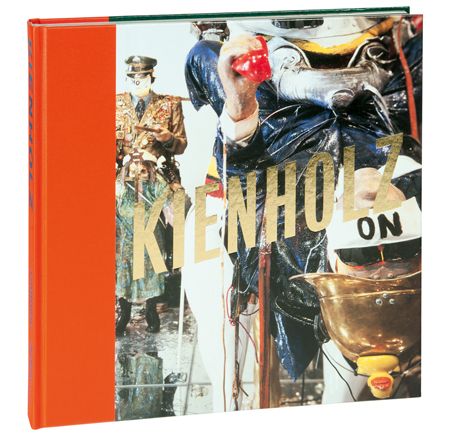EDWARD KIENHOLZ
SIGNS OF TIME
edited by Max Hollein, Martina Weinhart
foreword by Max Hollein
text by Dietmar Dath, Martina Weinhart, Cécile Whiting
interview with Nancy Reddin Kienholz by Martina Weinhart
Walther König, 2012
Edward Kienholz (1927–1994) was born in Fairfield, Washington, and grew up on a farm, where he acquired the mechanical and carpentry skills that he was later apply to his art. He moved to Los Angeles in 1955, and opened the NOW gallery in 1956. That year he met Walter Hopps, with whom he opened the legendary Ferus gallery, and began to construct assemblages from detritus found on the streets, which soon developed into large tableaux. Throughout the 1960s, Kienholz’s art was frequently a subject of controversy for its brutal depiction of racism and misogyny in America. In 1981, Kienholz officially declared that all his work from 1972 on should be retrospectively understood to be coauthored by his wife and collaborator, Nancy Reddin Kienholz. Kienholz died suddenly in Idaho on June 10, 1994, from a heart attack. He was buried inside one of his works, a 1940 Packard coupe containing a deck of cards, a bottle of wine and the ashes of his dog Smash.
SIGNS OF TIME
edited by Max Hollein, Martina Weinhart
foreword by Max Hollein
text by Dietmar Dath, Martina Weinhart, Cécile Whiting
interview with Nancy Reddin Kienholz by Martina Weinhart
Walther König, 2012
Edward Kienholz (1927–1994) was born in Fairfield, Washington, and grew up on a farm, where he acquired the mechanical and carpentry skills that he was later apply to his art. He moved to Los Angeles in 1955, and opened the NOW gallery in 1956. That year he met Walter Hopps, with whom he opened the legendary Ferus gallery, and began to construct assemblages from detritus found on the streets, which soon developed into large tableaux. Throughout the 1960s, Kienholz’s art was frequently a subject of controversy for its brutal depiction of racism and misogyny in America. In 1981, Kienholz officially declared that all his work from 1972 on should be retrospectively understood to be coauthored by his wife and collaborator, Nancy Reddin Kienholz. Kienholz died suddenly in Idaho on June 10, 1994, from a heart attack. He was buried inside one of his works, a 1940 Packard coupe containing a deck of cards, a bottle of wine and the ashes of his dog Smash.
